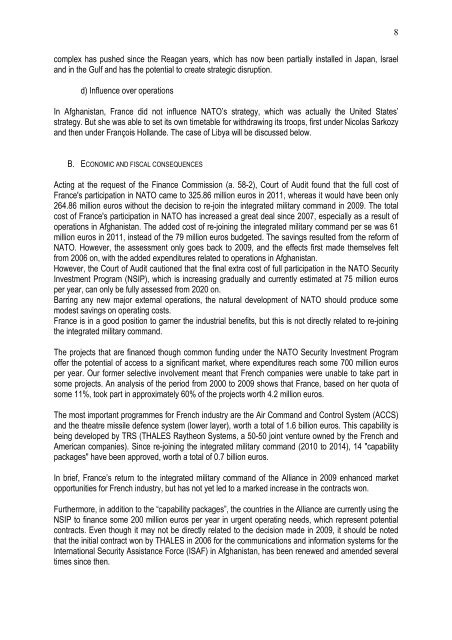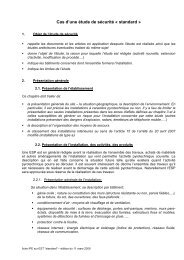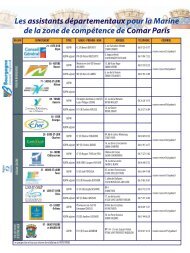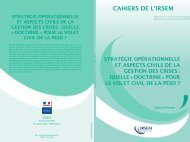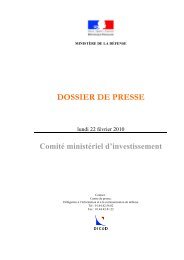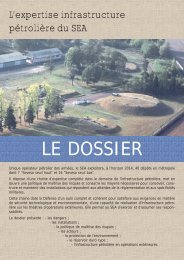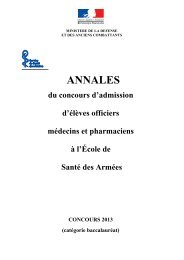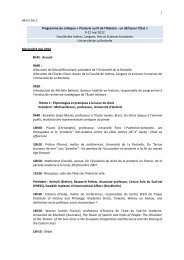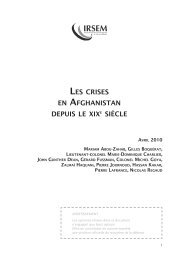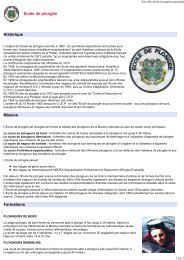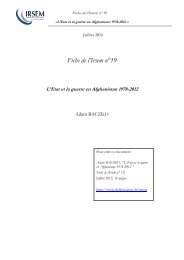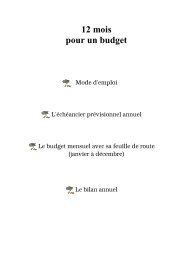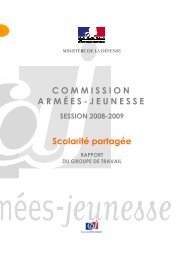Rapport Védrine_ENG_GERMAN - Ministère de la Défense
Rapport Védrine_ENG_GERMAN - Ministère de la Défense
Rapport Védrine_ENG_GERMAN - Ministère de la Défense
Sie wollen auch ein ePaper? Erhöhen Sie die Reichweite Ihrer Titel.
YUMPU macht aus Druck-PDFs automatisch weboptimierte ePaper, die Google liebt.
complex has pushed since the Reagan years, which has now been partially installed in Japan, Israel<br />
and in the Gulf and has the potential to create strategic disruption.<br />
d) Influence over operations<br />
In Afghanistan, France did not influence NATO’s strategy, which was actually the United States’<br />
strategy. But she was able to set its own timetable for withdrawing its troops, first un<strong>de</strong>r Nico<strong>la</strong>s Sarkozy<br />
and then un<strong>de</strong>r François Hol<strong>la</strong>n<strong>de</strong>. The case of Libya will be discussed below.<br />
B. ECONOMIC AND FISCAL CONSEQUENCES<br />
Acting at the request of the Finance Commission (a. 58-2), Court of Audit found that the full cost of<br />
France's participation in NATO came to 325.86 million euros in 2011, whereas it would have been only<br />
264.86 million euros without the <strong>de</strong>cision to re-join the integrated military command in 2009. The total<br />
cost of France's participation in NATO has increased a great <strong>de</strong>al since 2007, especially as a result of<br />
operations in Afghanistan. The ad<strong>de</strong>d cost of re-joining the integrated military command per se was 61<br />
million euros in 2011, instead of the 79 million euros budgeted. The savings resulted from the reform of<br />
NATO. However, the assessment only goes back to 2009, and the effects first ma<strong>de</strong> themselves felt<br />
from 2006 on, with the ad<strong>de</strong>d expenditures re<strong>la</strong>ted to operations in Afghanistan.<br />
However, the Court of Audit cautioned that the final extra cost of full participation in the NATO Security<br />
Investment Program (NSIP), which is increasing gradually and currently estimated at 75 million euros<br />
per year, can only be fully assessed from 2020 on.<br />
Barring any new major external operations, the natural <strong>de</strong>velopment of NATO should produce some<br />
mo<strong>de</strong>st savings on operating costs.<br />
France is in a good position to garner the industrial benefits, but this is not directly re<strong>la</strong>ted to re-joining<br />
the integrated military command.<br />
The projects that are financed though common funding un<strong>de</strong>r the NATO Security Investment Program<br />
offer the potential of access to a significant market, where expenditures reach some 700 million euros<br />
per year. Our former selective involvement meant that French companies were unable to take part in<br />
some projects. An analysis of the period from 2000 to 2009 shows that France, based on her quota of<br />
some 11%, took part in approximately 60% of the projects worth 4.2 million euros.<br />
The most important programmes for French industry are the Air Command and Control System (ACCS)<br />
and the theatre missile <strong>de</strong>fence system (lower <strong>la</strong>yer), worth a total of 1.6 billion euros. This capability is<br />
being <strong>de</strong>veloped by TRS (THALES Raytheon Systems, a 50-50 joint venture owned by the French and<br />
American companies). Since re-joining the integrated military command (2010 to 2014), 14 "capability<br />
packages" have been approved, worth a total of 0.7 billion euros.<br />
In brief, France’s return to the integrated military command of the Alliance in 2009 enhanced market<br />
opportunities for French industry, but has not yet led to a marked increase in the contracts won.<br />
Furthermore, in addition to the “capability packages”, the countries in the Alliance are currently using the<br />
NSIP to finance some 200 million euros per year in urgent operating needs, which represent potential<br />
contracts. Even though it may not be directly re<strong>la</strong>ted to the <strong>de</strong>cision ma<strong>de</strong> in 2009, it should be noted<br />
that the initial contract won by THALES in 2006 for the communications and information systems for the<br />
International Security Assistance Force (ISAF) in Afghanistan, has been renewed and amen<strong>de</strong>d several<br />
times since then.<br />
8


